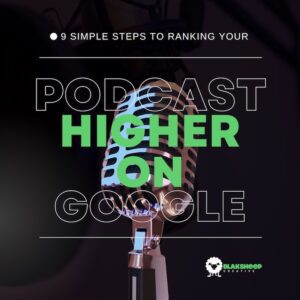In 2019, Google announced that podcasts would start showing up in the Search Engine Results Pages (SERPS). Because of this, podcast search engine optimization is an excellent opportunity to build an audience through organic search traffic.
A recent webinar from Edison Research explained how podcast listening is on the rise, with a 150% increase since 2014.
Because of this increase, you can expect podcast SEO to be a growing term among digital marketing and SEO professionals and podcast hosts.
“Podcast SEO” is now a popular term, and there is an excellent opportunity for successful podcasts to build their audience through search traffic.
So what is Podcast SEO, and how can you optimize your podcast for search engines?
We’re glad you asked. Here’s everything that you need to know.
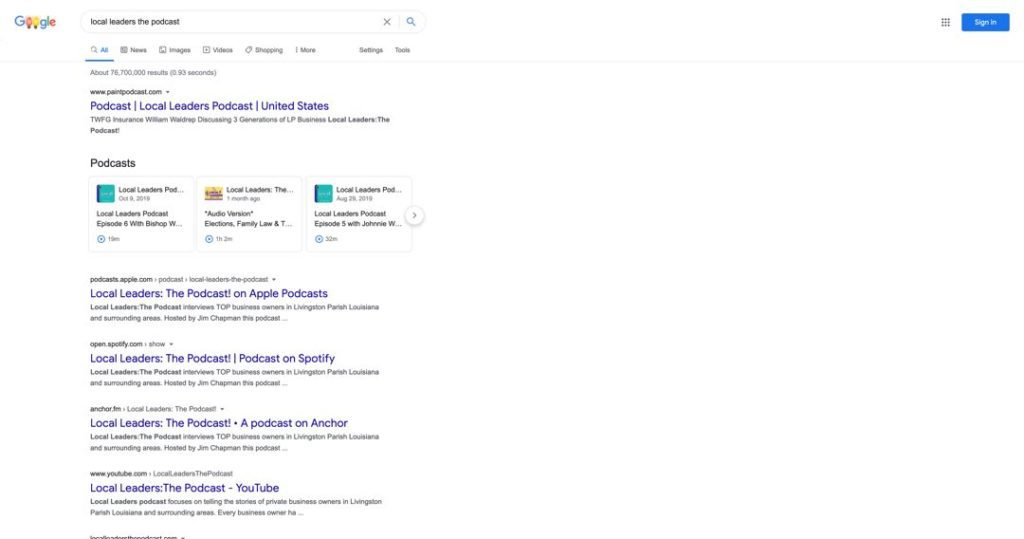
Podcasts are displayed in Google searches.
Potential listeners can search for a podcast and find episodes to listen to right there on the search results.
The podcast’s indexing will return audio content for listeners to listen to directly.
Google and other search engines’ can analyze your show’s audio and automatically transcribe it to highlight a specific podcast in relevant search results.
Google Podcasts already transcribes the podcast to use the content as metadata to help people find specific information that’s part of an episode without knowing about the podcast before.
This is huge because it shows Google’s hand. Although Google is super-secretive and never tells us exactly how their ranking algorithm works, sometimes they’ll give hints or suggestions (such as automatically transcribing podcasts or their helpful content update) that help us SEO professionals make changes to gain their favor.
Google is going to start indexing podcasts and return audio results in SERPs. That means voice answers are going to be direct clips from audio content at some point soon.
— Dr. Pete Meyers (@dr_pete) May 7, 2019
How does this tie into podcast SEO?
Keep reading, you’ll see.
Think of SEO when structuring your episodes
So, how do these hints and changes from Google affect your podcast?
Let’s start by talking about the structure of your pieces of content.
Although a podcast can feel like a casual conversation between friends, it should have a structure and a theme.
Whether you’re producing formal or informal content, you must have a clear theme.
Think about what topics you want to talk about and how your questions can flow from one to another.
Keeping things flowing smoothly helps Google understand and index your show’s content.
Plus, having a clear theme will help your listeners to understand your primary focus and not get lost in the conversation.
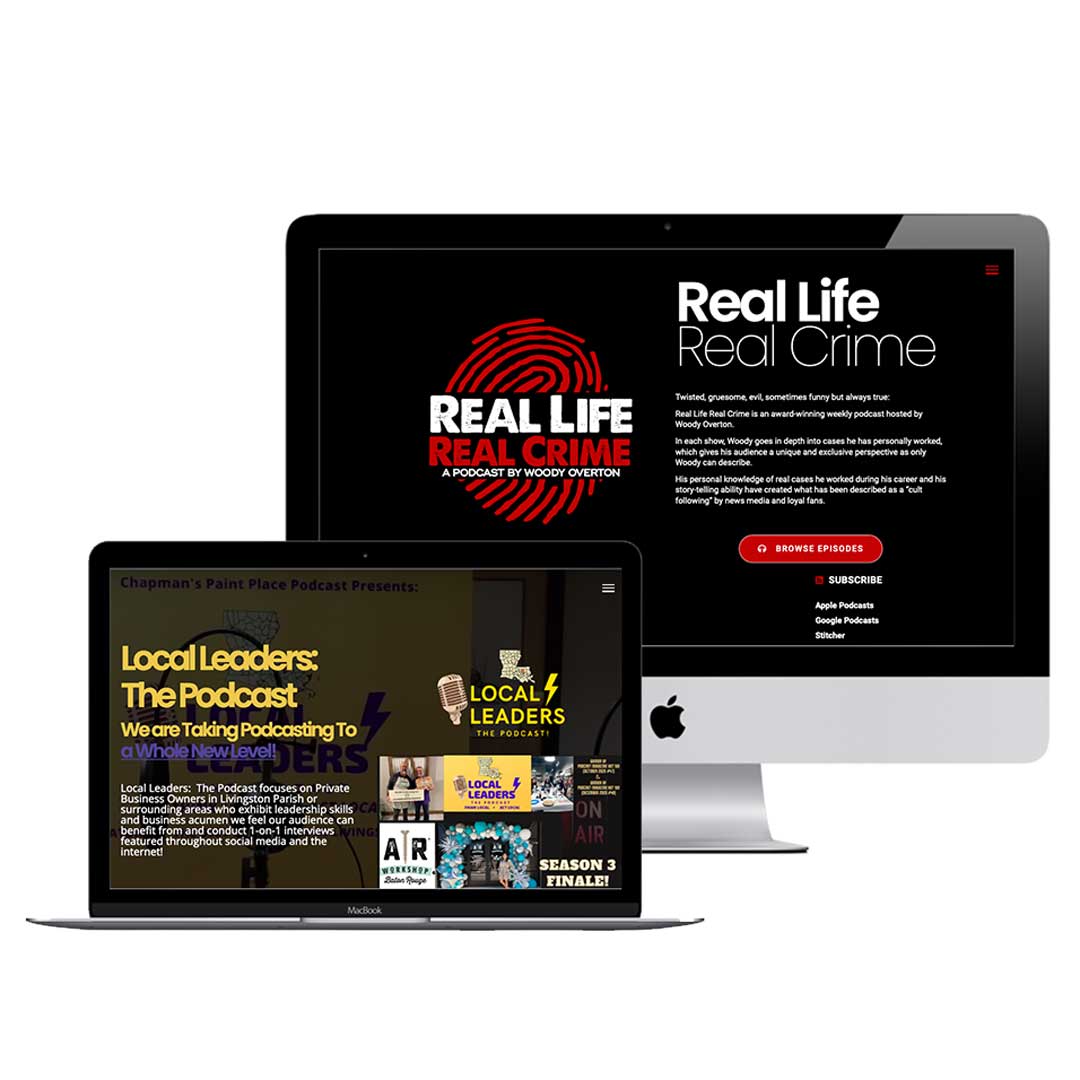
Creating a website for your podcast
It’s not required for you to have a website to start your podcast; however, it’s beneficial.
Learn the benefits of having a website for your podcast and why it’s a must. If you’d rather have a professional create one for you, visit our podcast website service page to learn how we can help.
All you need for your podcast is a hosting provider like Audioboom or Libsyn.
However, if you want to succeed, you’ll need to start thinking of SEO more seriously and make sure that you own your data and relationship with your subscribers.
Having a website for your podcast will help you build an email list to grow your fanbase. Plus, a website can help you improve your podcast’s SEO because it’s easier for search engines to discover and understand your episodes when you provide additional context to them.
The best way to give search engines more context is by publishing a new blog post for each audio or video episode.
Having posts for each episode is a great way to build your podcast’s content and makes it easier for search engines to understand your central theme and target keywords.
Treat these posts for your podcast just like you would any other blog post, and make sure to link from one episode to another. The goal is to keep your audience engaged.
Since we mentioned it, let’s dive deeper into how keywords and podcasting go hand-in-hand.
Add keywords to your podcast episodes.
First, your podcast’s title is your number-one keyword. But that’s not the only thing you want to rank for in the SERPS. If you only ranked for your podcast’s name, people would have to be already searching for it specifically to find it. That won’t help you grow your audience, now will it?
Instead, when creating content for your episodes, choose one primary keyword to describe it.
Consider the episode’s theme, structure, topics, guests, etc., and choose a keyword to describe it.
Don’t optimize every episode for the same keyword.
Using the same keyword on each episode increases your risk of what we SEO professionals call cannibalization. Cannibalization is essentially competing against yourself, having two separate pieces of content ranking for the same phrase, topic, or keyword.
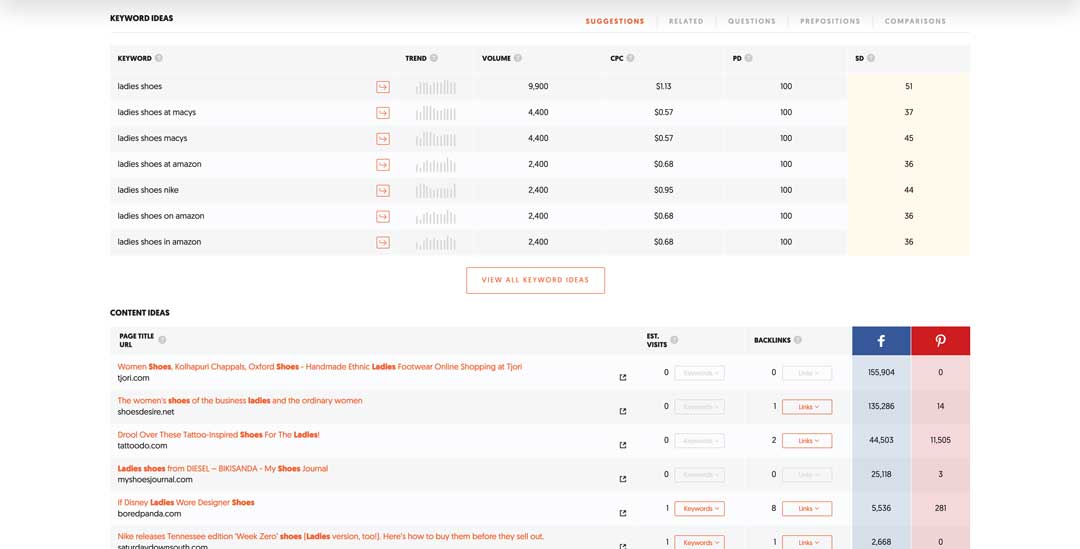
Instead, perform keyword research and find keywords with a high search volume and (preferably).
Consider shooting for long-tail keywords. Long-tail keywords are broader keywords that are easier to rank for.
We discuss long-tail keywords more in-depth in our super SEO post….
Choose episode titles carefully.
Your episode titles will determine whether potential listeners will actually listen to them.
Even when someone discovers your show, they aren’t guaranteed to listen to every episode if your titles aren’t appealing enough.
Keep your titles clear and descriptive, and keep character limitations in mind.
Podcastwebsites.com has an excellent article about titling your episodes that’s worth a read.
Adding your keyword in the title is a must, but make sure to add it in context with the rest of the content.
Should you include the episode’s transcript?
Yes!
Even though Google transcribes the podcasts, they aren’t perfect.
Providing written content of your episodes helps search engines understand them in more detail. Written content can drastically improve your episodes’ discoverability by focusing on keywords, content structure, and topics.
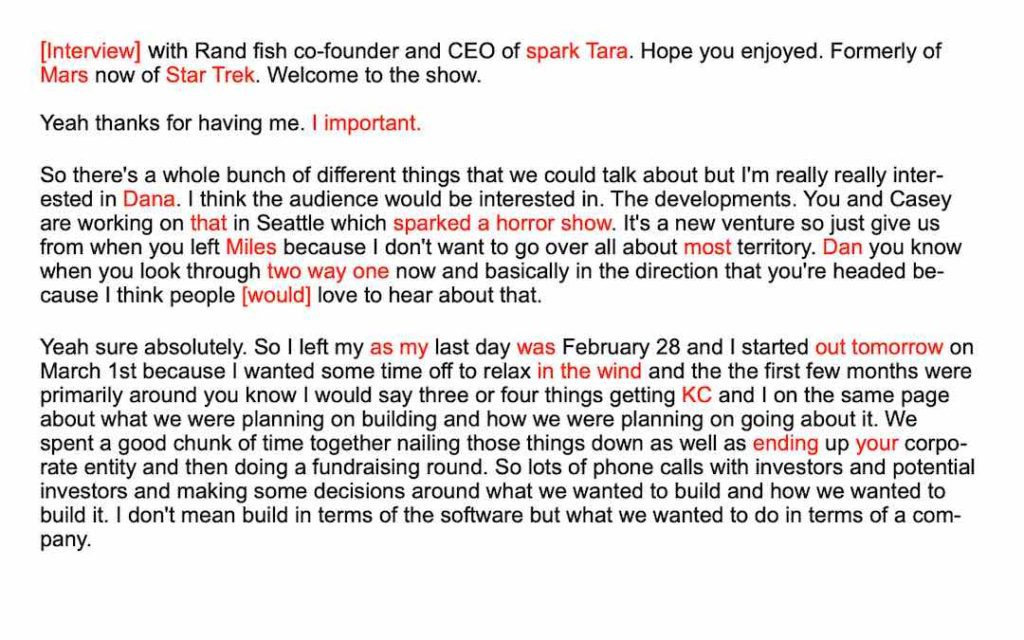
Plus, a transcription makes your podcast more accessible to people (especially your hearing-impaired fans). If you want to get fancy, you can split the topics that you’re discussing into time brackets to help all listeners find them easily in the audio or video content.
We realize that podcast transcriptions can be time-consuming and that not every host might be ready for this step. Still, if you’re serious about building your audience and improving your podcast’s SEO, we advise you to consider it.
You’ll benefit in the longer term, we promise.
Podcast Metadata
Just like any other content on the web, metadata can provide additional details about your content. For example, your episode description should explain what the episode is about and offer potential listeners more insight into the topics covered.
Plus, the meta description (metadata) is great SEO real estate to allow search engines to comprehend your episode’s topic.
Add your primary keyword, but don’t get carried away. Unnatural use of your keywords repeatedly is known as keyword stuffing, and Google hates keyword stuffing.
Another piece of metadata, tags, are also helpful for your SEO. Tags allow people to discover episodes by looking at specific genres or categories.
Feel free to add several tags, as long as they are relevant to your podcast.
Think of your potential audience and what terms they’ll likely type in search boxes to find your podcast.
Link to your podcast on all social media
Link building is at the crux of any SEO, be it a syndicated blog or a small local podcast.
Plus, sharing is caring.
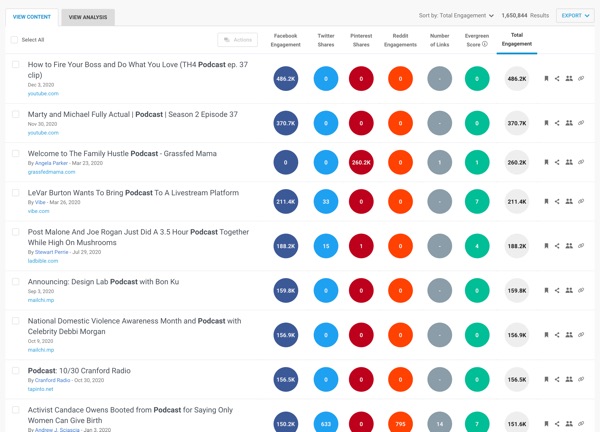
An indication of any podcast’s success is the number of shares and comments it receives on social media.
You don’t have to be as big as Joe Rogan to benefit from positive comments or shares on social media.
By the way, search engines take note of people engaging with your podcast on social media; this is called social signals. Google loves user engagement.
Back to linking your podcast on social media.
Like any other content online, content marketing is a vital way to ensure your success.
Choose social media channels and other forms of promotion based on your topics and target audience.
For example, An auto mechanic podcast might not benefit as well from Pinterest as they may from Facebook.
Next, encourage people to share the link if they’ve enjoyed your show and create tracking links (GTM) to find the best performing channels.
Sales Pitch Alert!
Data and analytics are kind of our thing. We can help you track and analyze your podcast data and show you ways to expand your reach. Contact us if you’d like to learn how we can help you.
End sales pitch.
Need help promoting your episodes? Visit our social media marketing for podcasters service page to learn how we can help.
Reviews make for great social proof.
Reviews from listeners play a massive factor in your podcast’s success. It’s not just an indicator of your podcast’s quality but improves your social proof.
Encourage your listeners to leave you a review if they’ve enjoyed the podcast.
Start with your current subscribers, and make it as effortless as possible.
Social proof is beneficial for your podcast’s SEO because it informs search engines of the most successful and engaging content pieces.
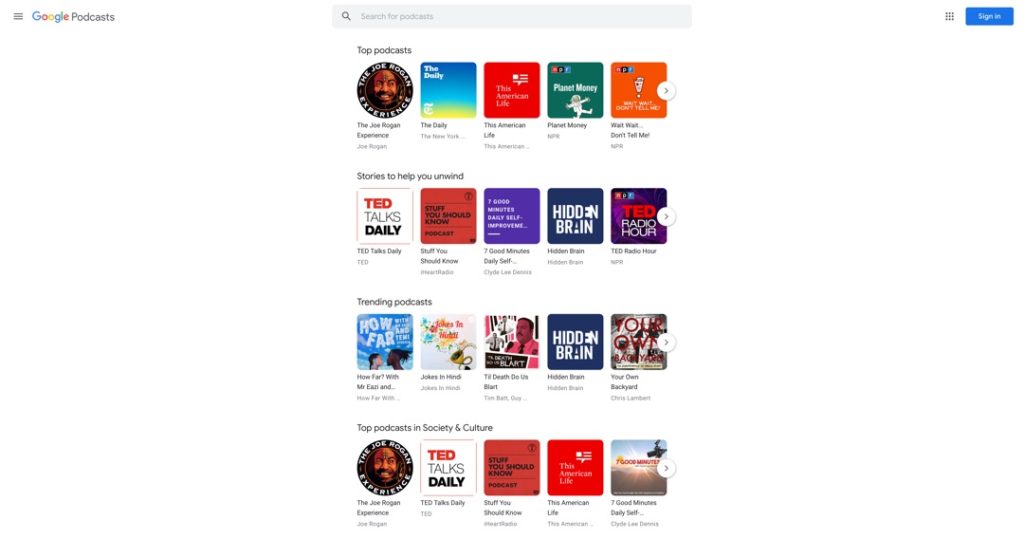
Add your podcast to Google Podcasts.
This one’s kind of a given.
Google Podcasts is owned by… you guessed it…. Google.
So, uploading your podcasts to Google is another way to show up on their radar.
If you’re not uploading your podcasts to Google Podcasts yet, it’s fast and easy to do. Just add your podcast’s RSS feed.
By uploading your podcast to Google podcasts, you’re more likely to show up as an audio snippet in the coveted rich snippets.
Quality content first, SEO next.
Creating quality content should always be your focus.
Always.
Content and audio quality are the main factors in your podcast’s success. Promotion and search engine optimization will only work if you have a good starting point for your podcast.
Come up with a creative title, a unique topic, and pay attention to your sound quality. Focusing on these things will help your audience connect with you, and you can work with that to increase your success with SEO.
Let us know if you have any comments or questions about Podcasting SEO or anything we can help you with.

